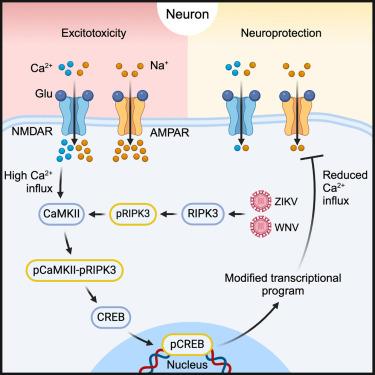The kinase RIPK3 promotes neuronal survival by suppressing excitatory neurotransmission during central nervous system viral infection
IF 25.5
1区 医学
Q1 IMMUNOLOGY
引用次数: 0
Abstract
While recent work has identified roles for immune mediators in regulating neural activity, how innate immune signaling within neurons influences neurotransmission remains poorly understood. Emerging evidence suggests that the modulation of neurotransmission may serve important roles in host protection during infection of the central nervous system. Here, we showed that receptor-interacting protein kinase-3 (RIPK3) preserved neuronal survival during flavivirus infection through the suppression of excitatory neurotransmission. These effects occurred independently of the traditional functions of RIPK3 in promoting necroptosis and inflammatory transcription. Instead, RIPK3 promoted phosphorylation of the neuronal regulatory kinase calcium/calmodulin-dependent protein kinase II (CaMKII), which in turn activated the transcription factor cyclic AMP response element-binding protein (CREB) to drive a neuroprotective transcriptional program and suppress deleterious glutamatergic signaling. These findings identify an unexpected function for a canonical cell death protein in promoting neuronal survival during viral infection through the modulation of neuronal activity, highlighting mechanisms of neuroimmune crosstalk.

RIPK3激酶通过抑制中枢神经系统病毒感染期间的兴奋性神经传递来促进神经元存活
虽然最近的工作已经确定了免疫介质在调节神经活动中的作用,但神经元内的先天免疫信号如何影响神经传递仍然知之甚少。新出现的证据表明,在中枢神经系统感染期间,神经传递的调节可能在宿主保护中起重要作用。在这里,我们发现受体相互作用蛋白激酶3 (RIPK3)通过抑制兴奋性神经传递来保护黄病毒感染期间的神经元存活。这些作用独立于RIPK3在促进坏死下垂和炎症转录方面的传统功能。相反,RIPK3促进神经元调节激酶钙/钙调素依赖性蛋白激酶II (CaMKII)的磷酸化,进而激活转录因子环AMP反应元件结合蛋白(CREB)来驱动神经保护转录程序并抑制有害的谷氨酸能信号传导。这些发现确定了典型细胞死亡蛋白在病毒感染期间通过调节神经元活动促进神经元存活的意想不到的功能,突出了神经免疫串扰的机制。
本文章由计算机程序翻译,如有差异,请以英文原文为准。
求助全文
约1分钟内获得全文
求助全文
来源期刊

Immunity
医学-免疫学
CiteScore
49.40
自引率
2.20%
发文量
205
审稿时长
6 months
期刊介绍:
Immunity is a publication that focuses on publishing significant advancements in research related to immunology. We encourage the submission of studies that offer groundbreaking immunological discoveries, whether at the molecular, cellular, or whole organism level. Topics of interest encompass a wide range, such as cancer, infectious diseases, neuroimmunology, autoimmune diseases, allergies, mucosal immunity, metabolic diseases, and homeostasis.
 求助内容:
求助内容: 应助结果提醒方式:
应助结果提醒方式:


